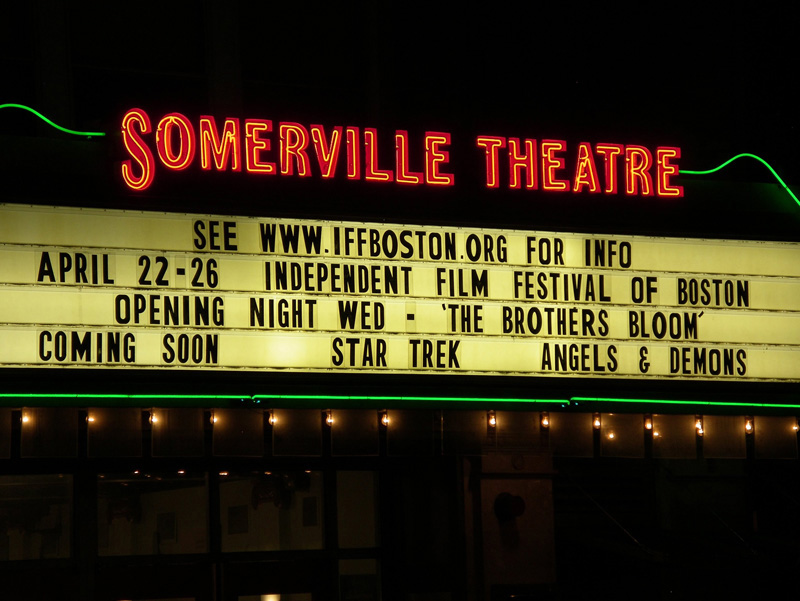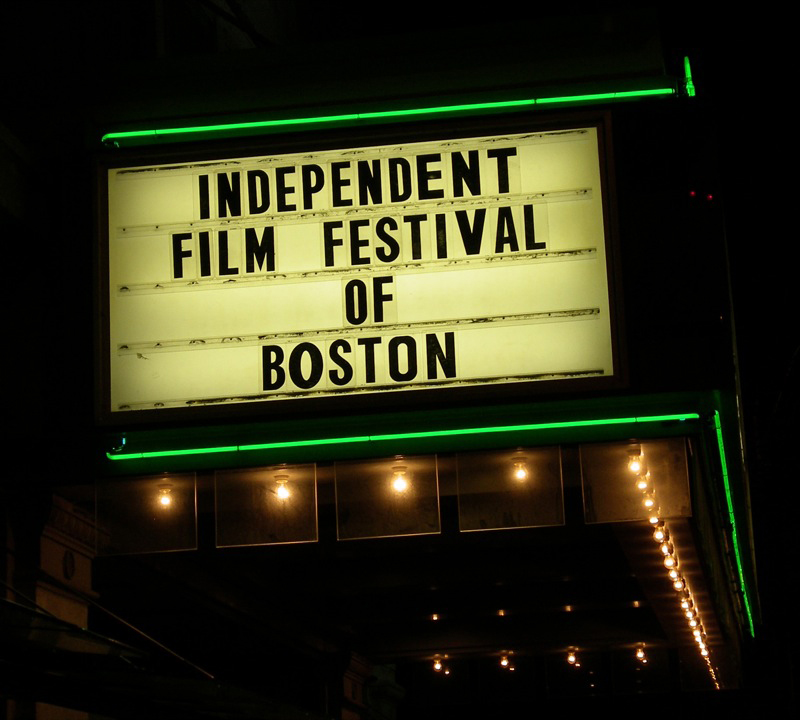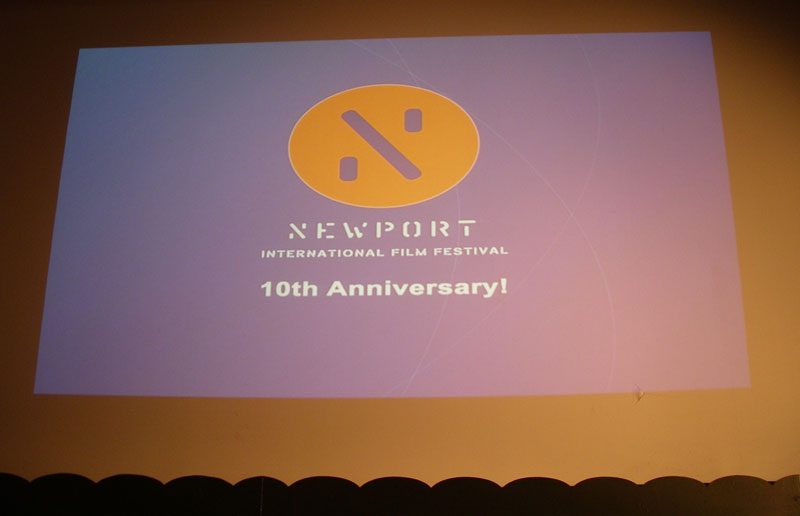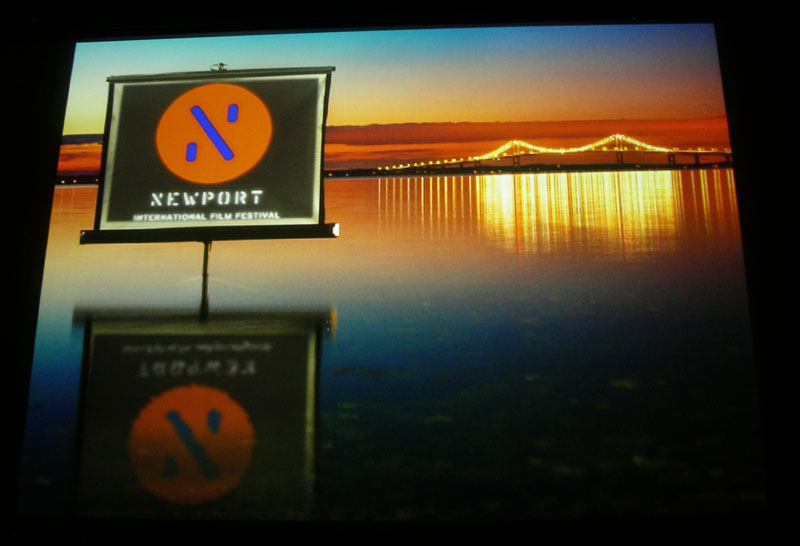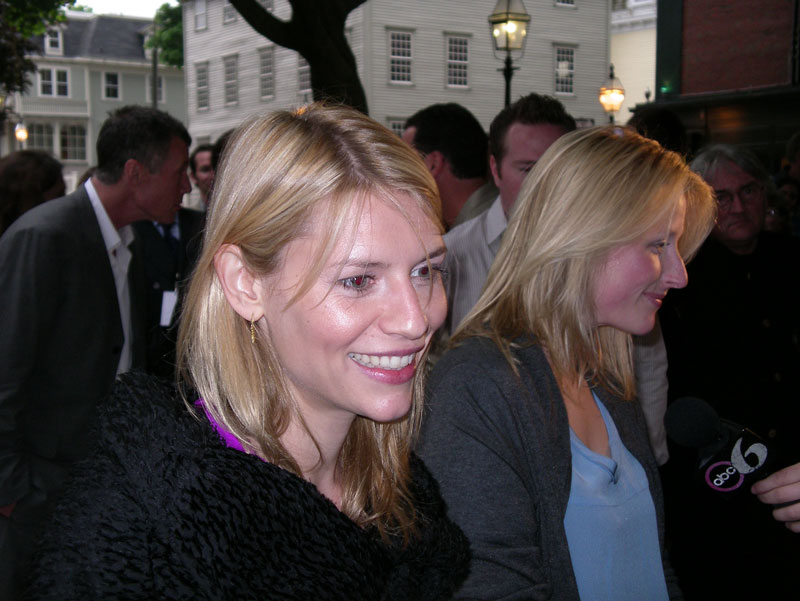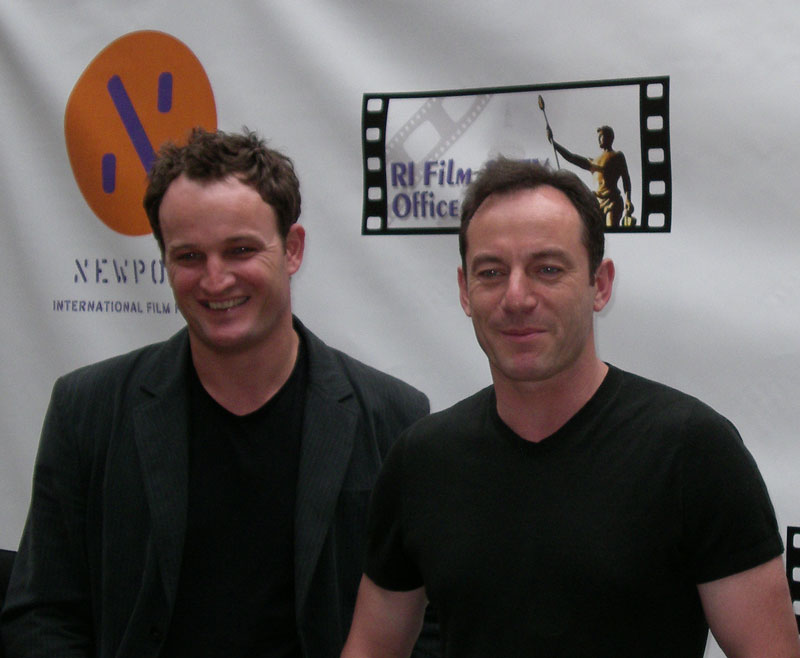|
|
||
|
Pro Tools
FILMFESTIVALS | 24/7 world wide coverageWelcome ! Enjoy the best of both worlds: Film & Festival News, exploring the best of the film festivals community. Launched in 1995, relentlessly connecting films to festivals, documenting and promoting festivals worldwide. Working on an upgrade soon. For collaboration, editorial contributions, or publicity, please send us an email here. User login |
AIFF 2011: Tears and Laughter in AshlandA pre-dawn dusting of snow fell on southern Oregon, wrapping Ashland like a gift. Morning’s bright sun melted white back to green to reveal the start of the 10th Ashland Independent Film Festival. By midday, the endless crisp, blue sky instead hung low, grey, and ominous. A freakish snow squall swirled around the queue in front of the Varsity waiting for the first slate of films, then the clouds lifted and the world shone bright again. Those changes - from cheery to dreary and back, from hopeful to mournful to joyous – stuck in my mind as the days progressed and came to represent this year’s Festival for me. For my first feature of the Festival, I rushed How to Die in Oregon. I wanted to see the film while in Oregon and I wanted to see it early, so as not to miss it. As it turned out, the timing added another layer to my experience. (For my full coverage of How to Die in Oregon, check out my Spotlight post.) After the film was over, I sat quietly through the Q&A until I was the last person in the theater besides the director, Peter Richardson. I wanted to ask him a few questions, but even after all the time it took for a full Q&A, I couldn’t speak. Literally. The muscles in my face wouldn’t respond to signals from my brain to let me form words. I was so emotionally overcome, that I was actually dumbstruck. For those that know me, “speechless” is not an adjective that springs to mind to describe me, even if sometimes they wish it would. And yet, here we were… I managed to exchange a few thoughts with Peter and moved along. As I left the building, I ran into AIFF’s Programming Director, Joanne Feinberg. “Hey, Todd. Did you see anything good yet?” “Well, I just saw your Best Documentary Award winner...” That was a pretty bold prediction for the first candidate seen, but prophetic. On Sunday night, How to Die in Oregon took home the Juried Prize for Best Documentary: Feature Length. Fortunately for my neural recuperation, the rest of the day was all about fun. Before heading over to the Ashland Springs Hotel for the Opening Night Bash and its outstanding local food and beverages and merriment, there was a special event over at the Armory to attend. Harry Shearer was in town for a triple-header. On Friday, his new documentary The Big Uneasy was playing followed by a showing of the mockumentary classic, This is Spinal Tap. Tonight, the crowd got to share a conversation with Harry as he was interviewed in front of a full house. To complement the career-spanning clips and comments that were presented through the evening, AIFF took the occasion to also present Mr. Shearer with a Rogue Award, the Festival’s salute to “ground-breaking, genre-bending, fiercely independent filmmakers”. -- Friday’s slate included screenings of Exit Through the Gift Shop, Kinyarwanda, and the aforementioned The Big Uneasy. Exit Through the Gift Shop is what comes from someone being in the right place at the right time, with a camera in his hand. Unexpectedly, the person (Thierry Guetta, aka Mr. Brainwash) holding that camera may have taken most of the footage, but he did not make this film. Instead, Thierry becomes its focus, and one of those he recorded (the UK’s phenomenal, enigmatic street artist, Banksy) flips the lens and the footage to show a remarkable, and remarkably entertaining, story. The unusual perspective of this story is perhaps best encapsulated by Banksy, making the following note about the subject of his own film: “I used to encourage everyone to make art… I don’t do that so much anymore…” Kinyarwanda uses a multi-threaded series of time-shifting vignettes – all based on true stories – and effectively weaves them together in a non-linear tale of violence and redemption set in genocidal era Rwanda. Diving into both pre- and post-Katrina New Orleans, The Big Uneasy plumbs the depths of a story we thought we already knew, dredging some uneasy truths up to the surface in the process. Where films like Trouble the Water, Mine, and When the Levees Broke: A Requiem in Four Acts focus on the lives either lost or left behind by the storm’s receding tide, Big Uneasy looks at the physical city itself - and at the infrastructure that was, and is still, supposed to keep that tide at bay. -- Saturday was filled with clever speakers exploring perception and façade: Silver Tongues, Morgan Spurlock’s POM Wonderful Presents: The Greatest Movie Ever Sold, and Morgan Spurlock himself. Silver Tongues is a fictional account of people who choose to inhabit different personas, briefly inject themselves into others’ lives, and leave behind disarray. POM is an actual accounting of people who choose to inhabit different personas, briefly inject themselves into others’ lives, and leave behind desire. With Silver Tongues, we’re not sure what’s reality and what’s pretense – a veil that begins to enshroud even the central characters. With POM, the veil of subliminal perception is torn back to reveal the world of brand marketing, advertising, and product placement. After personally observing a ham-handed product placement on network television, Spurlock set out to create a documentary about product placement, paid for entirely by product placement (hence the film’s title). The product of that effort is both insightful and laugh-out-loud funny, as one would expect from a Spurlock film. Among the nuggets mined at Q&A, we heard the story of how, in order to get fast food merchandising for the film, they had to go to vendor after vendor in order to find a fit – metaphorically working their way down the food-chain of food chains. In the spirit of POM, after Q&A, I asked Morgan if he had a Greatest Festival Blogger slot. He chuckled and explained the timing of the endorsement deals and where they were in the process. Still, he didn’t say “no”, so I’m calling “dibs”. A few hours later, the audience at the Armory was again treated to a lively discussion, this time with Spurlock, who would be presented with a Rogue Award of his own at the Awards banquet on Sunday. -- Sunday’s films were about fighting the good fight. On Sunday morning, I thought I’d check out the apparently family-friendly nature film The Last Lions with my friend Alan and his young sons. I saw Born Free in the theater as a child. The Last Lions is not Born Free. It is also not YouTube’s Christian, the one-time pet lion cub, reuniting with his human “parents” as an adult. It is instead the story of an isolated and dwindling pride whose existence outside a communal support network is Hobbesianly nasty, brutish, and, in some cases, short. Last Lions reminds us that in any predator-prey relationship, one side is trying to stave off death by evisceration, while the other side is trying to resist death by starvation. In this world, a momentary indulgence after a long-sought and well-earned triumph can open the door to heart-wrenching tragedy. It also contains moving images that will be etched into my memory for a long time. Images of a face, eyes squinted tightly shut in anguish; of a mind racing through options, all of them horrible; of someone at rock bottom, with no real choices left and nothing left to lose; of muscles relaxing and eyes opening, clear with resolve; of a lioness leaving the shattered remains of her life behind and forging, ahead, a new one – the embodiment of both meanings of “pride”. In Holy Wars, two men meet to have a conversation. Why is that the basis of a film? They are two religious fundamentalists from two different religions – two warring religions, if you were to ask them and many like them. Fresh-faced Aaron comes straight from the Bible Belt, evangelizing around the world. Khalid came from Ireland, a Catholic convert to Islam who grew up IRA, fighting in an anti-colonial struggle in his homeland only to perceive it happening again in a new place. Seeing one world through two very different sets of eyes adds a third dimension to this modern-day conflict. It has been said that one man’s terrorist is another man’s freedom fighter. If a Tree Falls: A Story of the Earth Liberation Front brings that concept home in the sphere of environmental activism. Some have never heard of the ELF. Of those that have, many only know of the spectacular, flaming destruction of property that often accompanies ELF protests. If a Tree Falls shows what happens before and after these events, chronicling the actions of both the impassioned ELF members and those who ignite those passions - and who would dub the ELF eco-terrorists because of their response to perceived aggression. One example: The US Forest Service sounds like it exists to protect America’s forests, right? But USFS is a part of the US Department of Agriculture. Doesn’t that suggest that our old-growth forests are instead being treated like crops to harvest, rather than as an irreplaceable resource to defend? Who then will defend these forests from their defenders? If a Tree Falls adds light to the heat that engulfs this burning issue. -- Monday lets moviegoers have another shot at some of the most lauded films of the festival, providing bonus screenings of award winners and sold-out shows. Hello Lonesome, a light and sweet film about loneliness and the need for connection, earned the Audience Award for Best Narrative Feature. By contrast, This Narrow Place, which took home the Juried Award for Best Narrative Feature slants dark and bitter. The two central characters begin the story deeply in pain, one seeking drugs, the other seeking vengeance. Somehow, they find each other, and perhaps a path to redemption. We’ve heard that a journey of a thousand miles beings with a single step. This film asks the question: how far along that journey can you be and still choose a different destination? Almost Kings is the tale of a teenager who finds out that the people you looked up to when you were younger aren’t always the people you want to look, or act, like when you get older. Thinking back to how my festival started with the Jury’s pick for Best Doc, wrapping up with The Welcome, the Rogue Creamery Audience Award: Best Documentary winner seemed a fitting bookend. I had no idea how true that was. The Welcome takes place in and around Ashland in the days leading up to Memorial Day, 2008. The premise was to invite veterans and loved ones to a retreat where they could spend time with each other in a safe and open environment that would allow them to express themselves in ways that they had not been able to before. The group would conclude the process by being given both stage and audience at the Oregon Shakespeare Festival in Ashland to share their new-found expression. The intent was to assist the healing process for two dozen people affected by PTSD. What was captured was an outpouring of raw emotion. Fear. Pain. Dread. Anger. Guilt. Horror. But also Relief – and Love. The counterpoint with How to Die was striking. In the first film, we have people who are trying to deal with the pain of death. In the last film, we have people that are trying to deal with the pain of life, after being surrounded by death. For the second time in less than I week, I was weeping and unable to speak. After five days and roughly twenty films, I was drained, but cathartically so. In the same way that seeing a meteorological forecast is not the same as being drenched in a downpour or sweating out a heat wave, reading a festival schedule is not the same as riding out a storm of dark emotion or being light-headed with laughter. Ultimately, for me, AIFF 2011 served as a reminder that the power of a well-crafted film can be as irresistible as Mother Nature. 02.04.2012 | Todd's blog Cat. : Academy Award for Best Documentary Feature AIFF AIFF 2011 AIFF’s Programming Almost Kings America Arts Ashland Ashland Ashland Independent Film Festival Ashland Independent Film Festival Ashland Springs Hotel Audience Award Banksy Banksy Banksy Born Free Brainwash Cinema of the United States Director Earth Liberation Front Elf Entertainment Entertainment Exit Through the Gift Shop Exit Through the Gift Shop Film food Greatest Festival Blogger Harry Shearer Harry Shearer Hello Lonesome Holy Wars How to Die in Oregon If a Tree Falls: A Story of the Earth Liberation Front Ireland Joanne Feinberg Joanne Feinberg Kinyarwanda Memorial Day Mine Morgan Spurlock Morgan Spurlock Morgan Spurlock Movie Ever Sold Mr. Brainwash Oregon Oregon Shakespeare Festival Person Career Peter Richardson Peter Richardson POM Wonderful Presents: The Greatest Movie Ever Sold Rogue Award Silver Tongues Southern Oregon Spinal Tap street artist the 10th Ashland Independent Film Festival the Audience Award THE BIG UNEASY The Big Uneasy The Greatest Movie Ever Sold The Last Lions the Oregon Shakespeare Festival The Welcome Thierry Guetta Thierry Guetta This is Spinal Tap This Narrow Place Thomas Hobbes Trouble the Water Trouble the Water, Mine, and When the Levees Broke US Department of Agriculture US Department of Agriculture US Forest Service When the Levees Broke: A Requiem in Four Acts YouTube Independent FESTIVALS
|
LinksThe Bulletin Board > The Bulletin Board Blog Following News Interview with IFTA Chairman (AFM)
Interview with Cannes Marche du Film Director
Filmfestivals.com dailies live coverage from > Live from India
Useful links for the indies: > Big files transfer
+ SUBSCRIBE to the weekly Newsletter Deals+ Special offers and discounts from filmfestivals.com Selected fun offers
> Bonus Casino
User imagesThe EditorUser contributions |



















